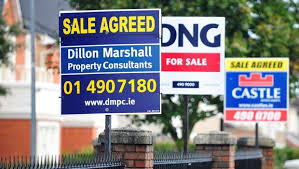RENTING
If you will soon be moving from one part of the country or city to another, or have recently arrived in Ireland, looking for somewhere to live can be challenging. The volume and range of rental accommodation available in Ireland will normally depend on the part of the country you are moving to. Larger cities and towns may offer greater options and price ranges than smaller towns and villages. On the other hand, rental prices outside larger urban areas are generally lower.
Advertisements, Accommodation Websites, And Word Of Mouth
A good place to start looking for a flat, apartment, or house is the accommodation section of local and evening papers and accommodation websites. Try to buy the paper as soon as it comes out. Accommodation may also be advertised in shop windows or notice boards in supermarkets and colleges. Tell everyone you know that you’re looking for a place; word of mouth is surprisingly successful. Some places, especially if they’re being let through an estate agent, will have “To Let” signs outside.
You should make an appointment to see the flat or house and arrive there early.
Using Accommodation Agencies
Accommodation agencies are commercial organizations that may charge a fee for helping you find private rented accommodation. They normally deal with more expensive accommodation than newspapers. If they charge a fee, it is normally about 50 euro.
Before you register with the agency and pay a fee, you should get answers to the following questions:
- Is the agency licensed?
- What services are offered for the fee?
- In what circumstances will you be entitled to a refund?
- How many landlords who accept rent supplements does the agency have on its list?
If you decide to register, make sure you get a receipt for any money you pay!
Looking Round A Flat Or House
Have a good look round the accommodation before making a decision. You might find the following checklist helpful:
- Are there any signs of dampness?
- Do the windows open?
- What security is available (i.e., window locks, burglar alarm)?
- Is a smoke detector provided and is it functioning?
- Who pays for the heat? What hours is it on, and who controls it?
- Is hot water available all or some of the time?
- Are the cooker and fridge clean and in working order?
- What sort of condition is the bathroom in?
- Do you have to share the bathroom, if so, how many others?
- Is there storage for bicycles, parking space, etc?
- Is there a bus route or other public transport nearby?
- Are there shops and other facilities nearby?
Deposits
Landlords will usually ask for a deposit, which might be a week or month’s rent. If you are receiving social welfare payments, your Community Welfare Officer may help with paying a deposit, although you may have to pay some of it yourself.
Make sure you get a receipt for any deposit you pay. You may lose your deposit if:
- You leave without giving proper notice or leave before the end of a fixed term lease
- You cause damage to the accommodation beyond normal wear and tear
- You leave with bills or rent unpaid
Before You Agree To Rent
Make sure you can afford the rent being asked. If you will be claiming rent supplement, make sure you know the local maximum rent level allowed by the Health Services Executive (HSE) Area. It is sensible to tell the landlord at this stage that you will be claiming it, since not all landlords will take tenants on rent supplement. Your local Health Services Executive (HSE) Area will need your landlord’s signature so he/she will have to know sooner or later. Read more about rent supplement in ‘Help with paying the rent’.
Be aware of your rights and your obligations and your landlord’s rights and obligations. Your landlord, for example, is obliged to provide you with a rent book. They are also obliged to ensure that the accommodation meets certain minimum physical standards. They should also register the tenancy with the Private Residential Tenancies Board, an organisation set up by the government to register tenancies and mediate disputes between landlords and tenants.
If the landlord wants to give you a fixed-term lease of six months or a year, don’t agree to this unless you’re sure you want to stay that long. If you leave before the end of a fixed term lease, you may lose your deposit. Read more about types of tenancy.
You should draw up and agree on a list of furnishings and appliances provided, with the landlord. This will help to prevent disputes during your stay and when you are leaving. If there are any signs of damage by previous tenants, make sure this is noted too. This list should be included in the rent book.If there are outstanding repairs, ask the landlord to state in writing that s/he will carry them out. Threshold, the housing organization, has useful publications on their webpage for people renting accommodation.
Where To Apply
Threshold
21 StoneybatterDublin 7IrelandTel: +353 (0)1 678 6096Fax: +353 (0)1 677 2407Homepage: www.threshold.ieEmail: advice@threshold.ie
Private Residential Tenancies Board
Floor 2O’Connell Bridge HouseDublin 2IrelandTel: +353 (0)1 6350600Fax: +353 (0)1 6350601Homepage: www.prtb.ie Email: information@prtb.ie


